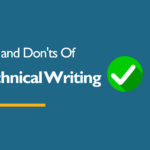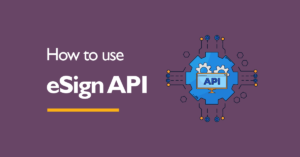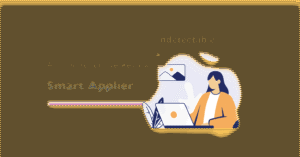The hardest thing about technical writing is knowing so much about a thing and not being able to find the language to communicate it. Lots of software engineers and developers face this challenge — and that’s where technical content writing comes in.
You don’t need a degree in technical writing to get started on this career path. If you love exploring new ideas and educating others about complex topics, especially in tech, you have a higher chance of excelling as a technical writer.
When I started working as a technical writer years ago, some of my earliest tasks included writing about multicloud computing, virtual learning tools, and document editing software. While a lot of the topics were initially strange to me, I was interested in learning how software and technology worked.
Three years in, tech blogging and SaaS content marketing have become my forte. Thanks to technical writing, I’ve been consistently hired to write articles without knowing a single line of code.
While interest is very important, this niche has its own rules of engagement. So, don’t expect to be an expert from the start. Instead, focus on getting the work done by applying all the tricks and tips I’ll share in this blog.
I’ve finally put together an all-in-one guide to starting out as a technical writer today. It covers all the fundamentals, including resources that can offer more insight into any questions you may have.
What is Technical Content Writing?
Technical content writing is the art of presenting technical information in simple, clear terms so that readers can understand complex topics or procedures. This type of content is intended to help users navigate a technical situation or learn about a software product.
More so, technical content can be accessed everywhere online, including blogs, websites, user manuals, and online support documents.
Many technical writers earn a living by contributing blogs and articles to SaaS companies and startups, as well as tutorials to open-source communities like Codecademy and Google Season of Docs.
While there are varying degrees of technical documentation, some are reserved for professionals who primarily work as developers.
For instance, you’d need some kind of programming knowledge to produce internal docs for API developers. While this is not always the case, it helps to have some experience in the technical field you’re writing on.
Essential skills to build as a technical writer
Making a career out of technical content writing requires a lot of effort, but always remember that it’s not out of reach. It all begins with equipping yourself with the right skills and putting together a portfolio of work.
Proficiency in written English
Success in technical content writing largely depends on your ability to distill complex ideas into user-friendly language that beginners and professionals can quickly grasp. This means your writing must not be laden with jargon but accessible to readers at all levels of experience.
The role of correct grammar and punctuation may seem understated, but they’re the cornerstone of any accessible technical documentation. Where required, you can take free writing courses to brush up on your writing skills and ensure clarity of ideas.
User experience and audience awareness
When planning the content outline, technical writers should tailor the document to meet the diverse needs of their audience. The article needs to be user-centered and contribute to a seamless user experience.
By resorting to best UX practices, you anticipate user questions and provide prompt answers within the article. This way, you’re not only creating insightful but also intuitive content, allowing users to access results quickly and efficiently.
Use of documentation tools and technologies
Understanding how version control systems, static site generators, and markup languages work can help you in your chosen field.
These technologies aid the integration of documentation into software development cycles, streamlining the documentation process.
Many technical writers collaborate with software development teams, so these documentation tools ease that process and ensure the content is up-to-date and version-controlled.
Attention to Detail
Technical writers are literally the bridge between technical teams and end-users, so they need to master error-free writing and consistency in communication. Attention to detail is crucial.
Precision requires you to catch errors before the content goes live, fact-check every detail, and ensure accuracy from start to finish. With this skill, your readers are most likely to trust your content, which ultimately raises the credibility of your product or company.
Self-editing
I cannot overemphasize the need to look over your work again before you hand it in. Editing is an essential skill every writer should have
But don’t edit immediately after writing. Put the text away for a few hours to let the ideas simmer. Waiting will offer you a fresh perspective on the work, and you can easily spot any omissions or poor writing.
Grammarly can help you detect logical errors such as misspellings, punctuation errors, or wordy sentences, but you’d still have to revise the article yourself.
Networking & Collaboration
As a beginner, joining communities online where you can find like-minded individuals pursuing similar interests will help your journey. You also need these networks to exchange knowledge and learn more about the industry’s trends and best practices.
This also requires putting yourself out there, which can be scary for introverts (like myself). As much as possible, you should share your work, collaborate with others on projects, and attend events to stay updated.
Tips to Get Started as a Technical Writer in 2025
Quite regularly, emerging writers ask me, “How do I get started?” Thinking back on my responses, I’m not sure I’ve articulated a coherent one. In this section, I’ve provided specific tips that have helped me and several other writers make a career out of technical writing.
Understand your audience
A good technical writer pays attention to the intended audience and writes in that context. For instance, when writing for beginners, you may need to break down many concepts, which may not be required for mid-level or senior professionals.
Consider the topic and who will use the document to understand for whom you are writing. I think every technical writer should be inclusive of all audiences at different experience levels.
After identifying your audience, you must also determine what the user will look for when they begin to read the document. This way, you can promptly answer the users’ questions within the text.
Conduct thorough research
No matter your knowledge level, you always have to research the topic you’re writing about. For starters, a diligent Google search can provide a great deal of insight, in addition to the resources you may get from employers.
Thorough research will also save you from plagiarizing other people’s content—which is an unethical way to begin your career. Rather, you can use these resources as references to develop your own ideas.
If you’re diving into technical content writing for software development, you’ll need some coding knowledge and lots of theoretical information about the subject. Don’t let the jargon scare you – look out for facts and figures from research journals, expert interviews, etc.
Write the way you speak
I first received this advice in 2020 after I reached out to an award-winning author to mentor me. The person mercifully read my attached samples and replied to my email, saying, ‘Your writing lacks form. You should write as you speak.’
Several years later, I learned that your writing not only has to express an opinion but also a bit of your personality. It should sound like you so that readers know they’re interacting with a human, not a bot.
With the explosion of AI content in the digital space, people and even search engines have grown bored and weary of dry, mechanical content.
Not all technical content should read like an instruction manual—always find ways to infuse your specific voice into the work so you can stand out.
Learn as you go
So you don’t get overwhelmed, it’s much easier to begin your technical writing process with easier projects. Complex topics like writing about blockchain, software development, or machine learning can be intimidating—but don’t be scared to push your boundaries too.
You can also ask for feedback after completing a project from someone you trust. Remember that constructive criticism will only help you improve if you apply the corrections.
Also, note that great technical content writing won’t happen overnight. It takes months, even years, of consistent practice. The more you write, the better you’re more likely to become.
Use relevant visuals/images
At specific points in the document, you’ll need to embed images and visuals to clarify your explanations. The right kind of visuals also helps break up long lines of text, as the most straightforward instructions can be lost in wordy language.
Working as a technical writer taught me that a picture can say a thousand words. In addition, some technical information cannot be easily transmitted in text alone.
For instance, when writing how-to tutorials, images make the content more readable and easy to follow. Search engines only regard quality content, so you can optimize your work by inserting infographics, GIFs, and tweets in the right places.
Create a writing portfolio
Building a technical writing portfolio is the fastest way to show credibility about your skillset and readiness to work. Moreover, getting hired for your experience depends on your ability to display these skills in your portfolio.
My advice to entry-level technical content writers is to work on projects that allow them to enhance their skills and expand their network of connections. Once you’ve selected a niche, you can start publishing helpful articles for free on Medium, Hashnode, or LinkedIn.
You can also offer to publish content as a guest on people’s websites, especially on topics you’re knowledgeable about. Guest blogging will also add to your credibility and status as an authority in that niche.
Note that publishing your work will open you up to praise and criticism. Some people may think your prose is too flowery, while others may call you mechanical. Be consistent either way.
Age, background, and level of expertise should not be seen as roadblocks. All you need is a willingness to learn and the capacity to receive feedback, and you’ll be already ahead of the game.
What Now?
It’s never too late to dive into technical content writing. And contrary to popular belief, artificial intelligence will not replace human writers any time soon. Businesses will still outsource projects to ghostwriters to help create copies and technical documentation.
At RoninPoint, delivering strong technical content is our first order of business. Whether you’re taking your business online or leading a tech startup, our technical writers can deliver user-centric content solutions within your preferred deadlines. Let’s work together to rewrite your brand story and tailor your product to a defined audience. Contact us right away to get started.
Who wrote this?
Iruoma Chukwuemeka is a serial writer. She creates engaging content with best SEO practices for clients who need reliable hands on their writing projects. She's also got an appetite for information and books.
- Iruoma Chukwuemekahttps://roninpoint.com/author/iruomachukwuemeka/October 15, 2024
- Iruoma Chukwuemekahttps://roninpoint.com/author/iruomachukwuemeka/July 25, 2024
- Iruoma Chukwuemekahttps://roninpoint.com/author/iruomachukwuemeka/May 11, 2024
- Iruoma Chukwuemekahttps://roninpoint.com/author/iruomachukwuemeka/March 15, 2024









